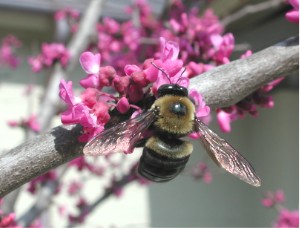Bees fall to Colony Collapse Disorder: an ecological warning sign

The pragmatic bias that predominates in U.S. scientific, economic and political institutions has for long accepted the notion that “if it works, its good.” In the midst of the present financial crisis and as the ecological warning signs seem to be blinking furiously, it would appear to be the moment to rethink the consequences of excessive reliance on that utilitarian principle.
When researchers began to churn out one insecticide after another, in tune with the dramatic innovations of genetic engineering, many observers naively concluded that men could rationally find a solution to such headaches as feeding an ever growing world population.
But…”Orange groves in Florida and California are falling to fast-moving blights with no known cure,” according to an editorial in the April Scientific American. What has also set the world a buzz is a mysterious affliction that has ravaged honeybee colonies around the U.S., jeopardizing an agricultural system that is utterly dependend on farmed, traveling hives to pollinate vast swaths of monoculture. “new evidence indicates that our agricultural practices are leading directly to the spread of human disease,” concludes the editorial.
Scientists and researchers around the world are pulling their hair out trying to discover why bee colonies are rapidly disappearing, putting at risk nearly 100 crops that require pollination. In fact, a mysterious disease--colony collapse disorder--seems to be devastating bees around the world, thus threatening the growth of fruit and vegetables. It has been estimated that the bee population in the U.S. alone has dropped by some 37%.
One of the causes explaining the colony collapse disorder…is the ever increasing use of chemicals and pesticides, leaving chemical deposits in the intestines of the bees examined. In a report by Diana Cox-Foster and Dennis vanEngelsdorp (Scientific American), it was hypothesized that “something had compromised the bees’immune system, making them susceptible to any number of infections that healthy colonies would normally fend off.” They also mentioned synthetic poisons. “The two main suspects were acaricides--chemicals beekeepers use to keep mites in check--and pesticides, ether in the environment or in the very field crops the bees were pollinating.”
The authors conclude: “Humankind needs to act quickly to ensure that the ancient pact between flowers and pollinators stays intact, to safeguard our food supply and to protect our environment for generations to come.”
A sort of AIDS for the bee colonies?
What is taking place among the world's bee popularion is yet another warning sign in a long list of human disruptions of natural processes. The source of this human disregard for nature, however, is the predominant view in industrialized (capitalistic) economies that “if it works, it’s good.” If pestcides kill micro-organismos that attack crops, why not use them? Yet in doing so the balance of nature is destroyed and without that balance the very notion of life as we know it is put in danger. One the one hand it is argued that the development of substances that can control or eliminate nasty attackers of healthy plants appears to be logical. The problem is that in doing so more often than not the ecological balance is disrupted, ironically producing an effect contrary to that desired. Something similar might be said of the anti-biotics now so common place in drug stores. They seem to work fantastically well. But they also disrupt the balance of micro-organisms that live in our bodies, bringing about the re-adaptation of microbes and viruses and forcing scientists and technicians to invent even more powerful anti-biotic treatment...
2 comentarios
Miyinalouzo -
Pavoguze -